It doesn’t matter that you were born thousands of miles from the place elephants roam free.
Almost every person on earth has an emotional connection to the thought of this oversized mammal with the ridiculous nose.
Whether you’ve encountered elephants in a zoo or a circus or a children’s book or a David Attenborough documentary… it is rare to meet someone who finds themselves entirely uninterested in elephants.
To meet them in person is always incredible.
To meet them in person, in the wild, is indescribable.
To meet them in person, in the wild, in a super herd… well. That is the dream.
Because the fortunate people who have spent time in their company all agree. Elephants are much more than mere mammals. As John Donne put it:
Nature’s great masterpiece. An elephant, the only harmless great thing.
Why are elephants so special amongst African animals?
- An elephant has an EQ that is almost as high as a chimpanzee’s (the size of the brain relative to body size). Their mind also shares the number of neurons and synapses found in a human brain, and it has a highly developed hippocampus and cerebral cortex.
- That big cerebral cortex? It makes elephants elegant problem solvers.
- They can even do basic arithmetic and keep track of relative quantities!
- Every elephant can recognize itself in a mirror. And knows all the other elephants in their herd. A single elephant can recognize as many as 30 companions by sight and by smell. And that is only where it begins as elephants have been known to acknowledge another elephant 23 years later, and they will recognize humans they have bonded with after decades have passed without seeing them.
- It is true what they say about their memory. Elephants will remember locations and danger signs long after the last time they encountered them.
- Speaking of danger – elephants are known to suffer from PTSD.
- And speaking of speaking – elephants have an understanding of syntax that suggests that they talk using language and grammar. Of course, they also use body language, and infrasound rumbles to chat over kilometers.
- They also sing! Yup. Eles recognize 12 tones and create melodies.
- A final act? Elephants are the only animal other than a human to mourn their dead, perform burial rituals, and return to visit graves.
If you are ready to meet these extraordinary creatures that we call elephants, we have handpicked the following natural and exclusive venues for your date with the giants:
Zimbabwe
Somalisa Acacia– Hwange
Elephants love acacia trees. And this camp is named for the acacia tree. It is beautiful synchronicity, and the camp’s splash pool borders onto the wild elephant waterholes allowing guests to enjoy an incredibly unique audience with these magnificent creatures.
There are two family tents and two standard tents at Somalisa Acacia. A private central area overlooks a small waterhole, and a deliberate fusion between interiors and the wilderness creates an organic atmosphere.
Outside camp, the Hwange National Safari Park is home to one of Africa’s last super herds. Almost half of Zimbabwe’s entire elephant populations live here, and herds of 350 can be found.
It is difficult to do justice to the joy that hours spent with a vast herd of elephants can provide. Watching them interact, go about splashing and spouting, and playing is a mesmerizing experience. Of course, watching the calves explore under the watchful eyes of their mothers and aunts is delightful, and after you spend a little time with them, you will start to glimpse their complex social structure and to listen in on their communications. Those infrasounds are outside human hearing frequency, but their rumblings transmit messages through vibrations in the ground, and you will be physically privy to these dispatches.
Witnessing the strong bonds between a family so large and complex is humbling.
As is the fact that you might count amongst the last humans on earth to enjoy the privilege of an elephant experience, in these numbers, in the wild.
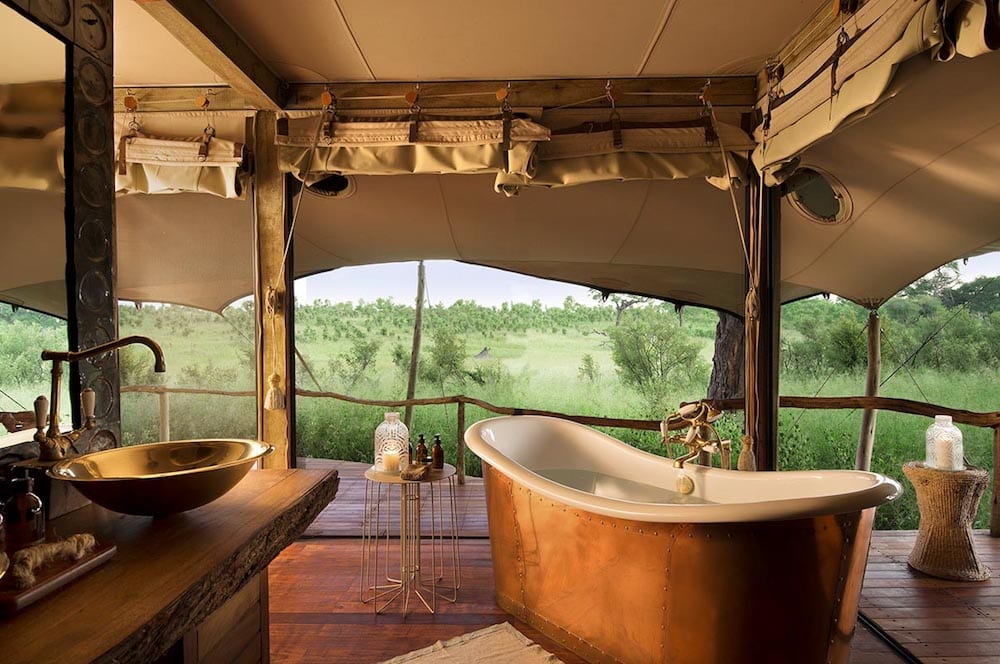
Botswana
Duma Tau – Linyanti
The Linyanti Wildlife Reserve lies along the western boundary of the busy and very famous Chobe National Park.
The area has large herds of elephants who meander along the Savute Channel.
DumaTau (the roar of the lion) has ten raised guest tents, including two family tents. Dramatic, unimpeded views span across Osprey Lagoon from the ceiling-height, glass, sliding doors. The camp runs on 100% solar energy.
Note: DumaTau will be closed from 1 November 2019 for a complete rebuild to open again in August of 2020.
King’s Pool Camp – Linyanti
It is difficult to resist a little well-placed royalty, and this camp (named for the Scandinativan King) overlooks the King’s Pool oxbow lagoon.
Nine thatch and canvas rooms have private verandahs from where guests can feast their eyes on birds, game, and especially elephants.
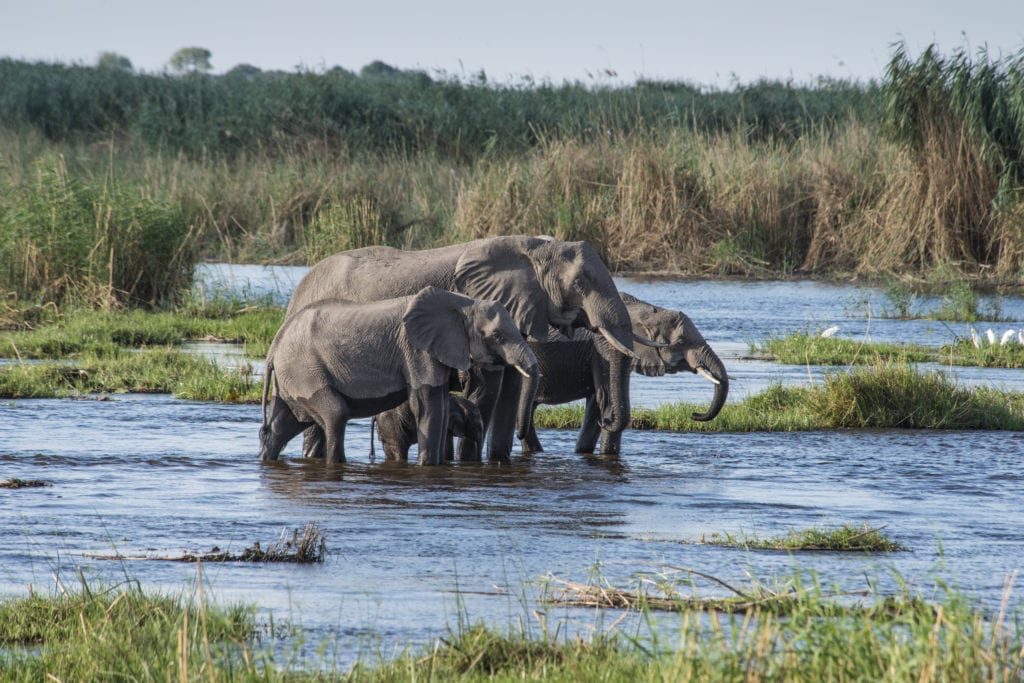 © Sheila Haddad/Danita Delimont– stock.adobe.com
© Sheila Haddad/Danita Delimont– stock.adobe.com
Kenya
Sarara/ Reteti – Kenya
It is no secret that Reteti has stolen our hearts!
The very remote Namunyak Wildlife Conservancy is an 850,000-acre area of pristine wilderness in the Mathews Range. Home to the Samburu, Sarara is an exclusive conservation brand partnering with indigenous communities to build sustainability for people and wildlife.
It is fast becoming a flagship model for community-led conservation throughout the continent.
The lodge nestles intimately within a limitless, pristine expanse where the mountains meet the desert.
Elephants often congregate at the watering hole below the rock-hewn lodge swimming pool. This is one of the many little miracles one can spy throughout Africa. In 1985 only a few elephants remained in this area. Through ecotourism and innovative community partnerships, thousands of elephants have returned to the Mathews Range (together with many other game species including leopard, buffalo, and wild dog.
Read more about Reteti here.
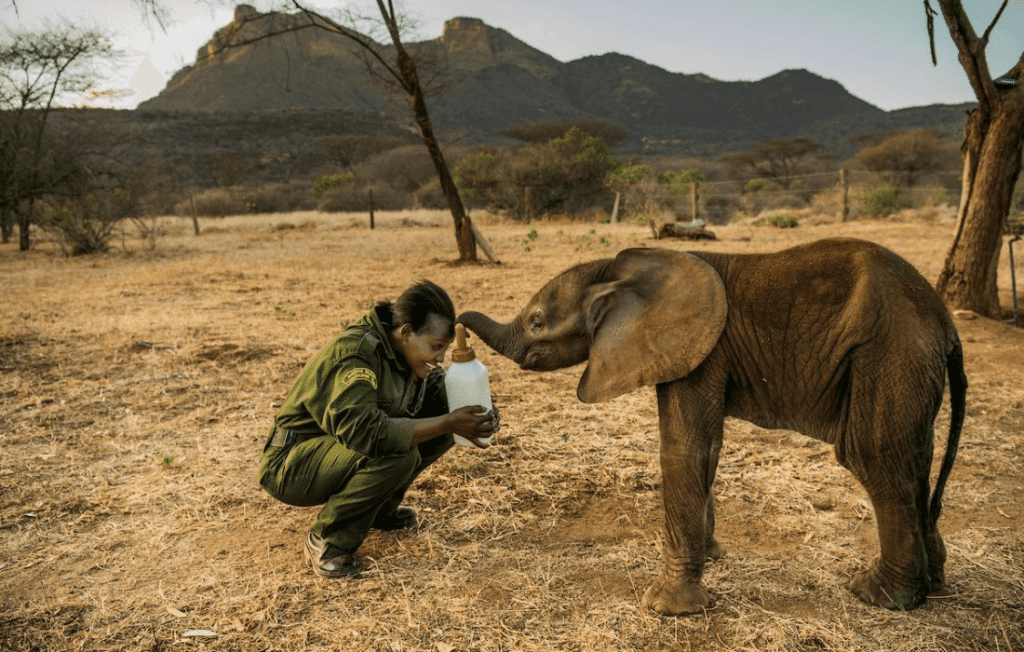 © Reteti
© Reteti
Namibia
Hoanib & Ship Wreck Lodge‑ Skeleton Coast
It can be difficult to imagine that this extreme, remote area of the Kaokoveld stretched like a canvas between the sunbleached bones of shipwrecks, over plains, and dry riverbeds could be the home of elephants. But a surprising wealth of desert-adapted animals live here—and among them, in the dry riverbeds, we find the rare desert elephant.
Desert adapted elephants are currently found in only two places on earth. Mali and the northern reaches of Namibia. They are the same species as the African Elephant, but their adaptations set them apart.
Leaner and taller with bigger feet and longer trunks than their family members who do not live in the desert, these eles move quickly across the soft desert sand where they often have to travel up to 124 miles (200 km) to find water.
The desert-adapted elephant’s long trunk allows it to dig for water, and their smaller size will enable them to survive without water for more extended periods. They only drink water every three or four days, and when they eat, they do not destroy or rip up the trees and plants they dine on. Desert adapted elephants also survive on a far more basic and limited diet leading to their tusks being more brittle.
At Hoanib, guests stay in one of eight spacious en-suite tents (including a family tent) overlooking the valley that runs down to the mostly dry Hoanib River.
The camp is 100% solar-powered, and as part of the area’s conservancies, it is committed to conserving a range of desert-adapted animals.
Further north, between the Hoanib and Hoarusib rivers in the Skeleton Coast National Park, enigmatic Shipwreck Lodge allows guests to take in the solitary landscape from one of eight twin or double and two family chalets.
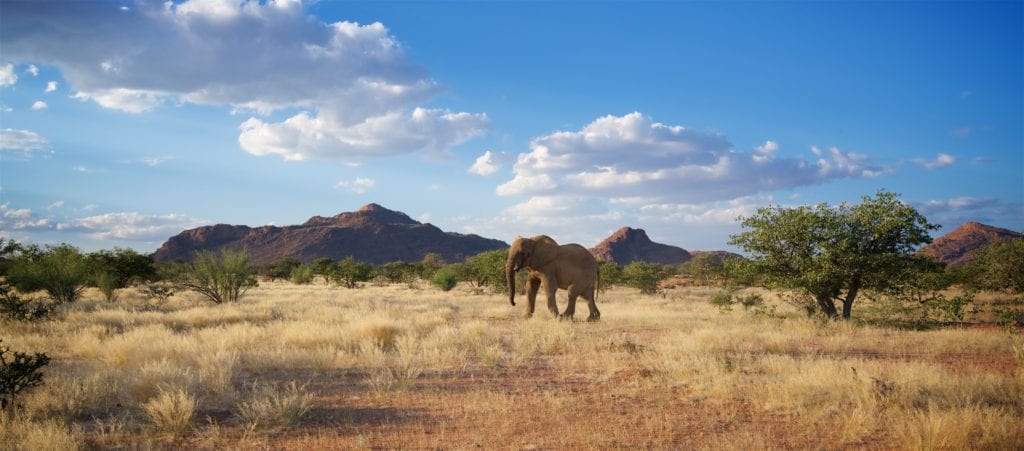 © Ben– stock.adobe.com
© Ben– stock.adobe.com
South Africa
The Outpost – SA
There is quite the view to be had from The Outpost’s position on an escarpment amid ancient baobabs, abundant fever trees, and rich birdlife.
A sense of remoteness prevails as the majority of safari guests choose to stay further south.
The Makuleke Concession of the Kruger National Park borders on Zimbabwe and Mozambique and contains 80 % of the park’s biodiversity. You may see a herd of trumpeting bull elephants crossing beneath your balcony.
The Outpost has 12 rooms (all with stupendous views from the escarpment) with a bathtub and shower separated from the wild only by floor to ceiling blinds.
You will notice a pattern running through all the Rothschild Safaris ethical safari recommendations as this concession is also owned and run by the local community.
Elephant herds are not very large here, but it is unique to see elephants privately in Kruger Park.
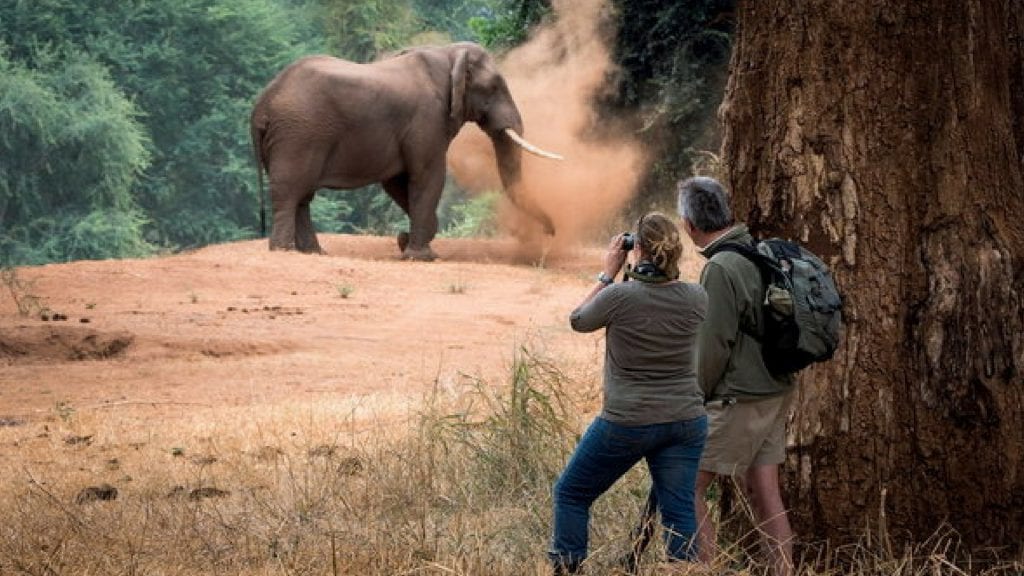 © Outpost
© Outpost
Tanzania
Chem Chem Tarangire
A success story that is as romantic as it is effective, Chem Chem was created out of lifelong love for the African elephant. It is a conservation haven where wildlife, people, land, and particularly elephants are respected and encouraged to flourish. and migrate once again now that their ancient migratory route has been reclaimed.
Boundless beauty surrounds this luxurious safari sanctuary between the Tarangire and Lake Manyara National Parks.
If you would like to take an ethical safari holiday to see a community work together to create a happy environment for elephants, Chem Chem is the perfect pick.

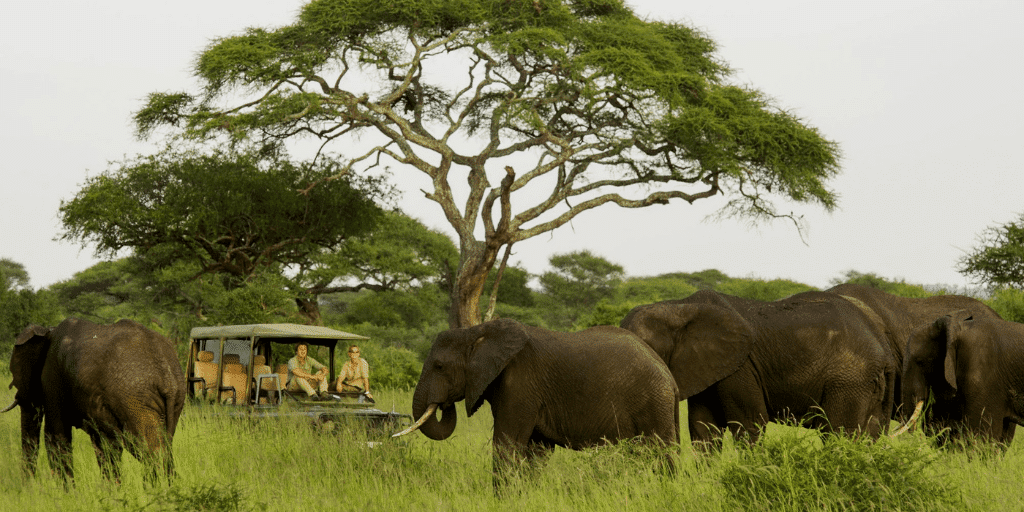 © Chem Chem
© Chem Chem